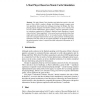Free Online Productivity Tools
i2Speak
i2Symbol
i2OCR
iTex2Img
iWeb2Print
iWeb2Shot
i2Type
iPdf2Split
iPdf2Merge
i2Bopomofo
i2Arabic
i2Style
i2Image
i2PDF
iLatex2Rtf
Sci2ools
156
Voted
CG
2006
Springer
2006
Springer
A Skat Player Based on Monte-Carlo Simulation
We apply Monte Carlo simulation and alpha-beta search to the card game of Skat, which is similar to Bridge, but different enough to require some new algorithmic ideas besides the techniques developed for Bridge. Our Skatplaying program integrates well-known techniques such as move ordering with two new search enhancements. Quasi-symmetry reduction generalizes symmetry reductions, popularized by Ginsberg's Partition Search algorithm, to search states which are "almost equivalent". Adversarial heuristics generalize ideas from single-agent search algorithms like A to two-player games, leading to guaranteed lower and upper bounds for the score of a game position. Combining these techniques with state-of-the-art tree search algorithms, our program determines the game-theoretical value of a typical Skat hand (with perfect information) in 10 milliseconds.
| Added | 20 Aug 2010 |
| Updated | 20 Aug 2010 |
| Type | Conference |
| Year | 2006 |
| Where | CG |
| Authors | Sebastian Kupferschmid, Malte Helmert |
Comments (0)

